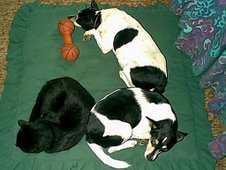A pet’s weight cannot be evaluated by just measuring the weight. It is more appropriate to observe the physical condition of the pet by comparing it with one of its own breed or species. The overall appearance of the pet is of prime importance since the ideal weight is very varied in case of pets or for that matter in all animals, in judging the obesity factor.
A scale of body condition scores is used in observation of physical condition of a pet. The body condition score is normally between 5 and 9, and a score of 7 is optimal or ideal. This score is assigned after observing a pets build, fat coverage on rib cage and the waist. Other factors that influence this score are sex, breed, age and life style.
Some observations that can help in your own assessment of your pet are suggested. The ribs should not be visible to the eye but should be easily felt without pressing. The stomach or the abdominal area should be tucked in. These simple tests or feels can be reviewed at home if the owner can objectively record the same. A veterinarian would be required for advice if you find that your pet does not possess the much sought after hour-glass physique. The owner should have a good reference point to infer the results from his observations, i.e. he should have good knowledge and information about the general physical appearance of the species of his pet.
Obesity decreases the life span of your pet, and an overweight pet is generally not healthy. Obesity may lead to diabetes, arthritis, heart complications, endocrinal diseases and bad joints. The medication for these conditions is also seriously compromised due to underlying obesity factors and age.
You pet is overweight because of the simple reason that it has more to eat and not enough exercise. The over feeding trend arises from the owners special way of showing love and care to their pets It is very important to keep tabs on the feeding habits of your pet. Many pet food packs carry a dosage level instruction, but it cannot be really depended upon. It is the owner who has to decide how much feed the pet since a lot of other factors like life style, exercise, activities, age etc. Most animals tend to overeat given the opportunity, curbing it is the owner’s responsibility. Taking advice from a veterinarian in regard to determining the pets ideal weight, creating a weight loss and maintenance plan, would be a good start.


No comments:
Post a Comment